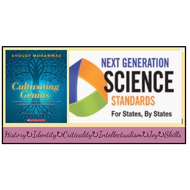
(View Complete Item Description)
Students learn about an astrophysicist that is working in science to open possible ideas for themselves in science careers. Pursuits addressed: Identity-Students will learn about people who they can relate to who are currently working in STEM related careers and study possible STEM related careers that could be meaningful to their own lives/cultures.Skills-The students will research scientists who they can relate to culturally who are working on STEM related careers and then write letters to these scientists in a way that is interesting, genuine, authentic, and allows them to use their own voice.Intellect-Students will choose which scientists they would each like to study by finding scientists who they can relate to culturally who are currently working in STEM related careers and showing examples of Black Excellence.Details: This lesson can be added to 5th Grade Amplify Patterns of Earth and Sky: Analyzing Stars on Ancient Artifacts, with Lesson 2.1 after looking for patterns, making observations, and reflecting on the Model. Explain to the students that this is exactly what astrophysicists do.
Material Type:
Lesson
Author:
The genius group from Madison Wisconsin













